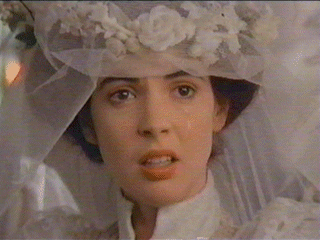
UPDATE [11/16/2007]: "May and June" has recently been released on DVD, as part of a package of British TV films based on the short stories of Ruth Rendell. Although the set is worth buying just for "May and June," you can, thanks to the technological breakthrough that is Netflix, simply rent the appropriate disc (ie., Disc 3) and watch it at your leisure. Think of it as a combination of All About Eve and Whatever Happened to Baby Jane, if those films had been written and directed by Rod Serling or Alfred Hitchcock.
It's very difficult to figure out after seeing "May and June" why Phoebe Nicholls never made it to the next level, why her name hasn't become as ubiquitous in reference to "great acting" as Helen Mirren or Meryl Streep. She shows here that she can carry a film by herself, and her performance is a master class of acting, turning what could have been a campy rehash of sibling rivalry cliches into something mythic. Nevertheless, her roles thereafter have all been of the supporting nature, and have pretty much been confined to British TV. She deserves better luck.
In "May & June", Nicholls portrays a woman who has always played second fiddle to her prettier, younger sister, but who collapses emotionally when she loses her fiance to her sibling. Twenty years later, having never married or achieved much in her life other than surviving, she attends the funeral of her ex-fiance, and meets her sister, now unbelievably wealthy but alone, and she is invited to move in with her as an act of reconciliation.
But it's clear that she has never gotten over the loss of her true love or the betrayal years before, which she has chosen to blame entirely on her sister. When she finds out that her sister's marriage had, in fact, been rocky, and that she had taken a lover during the final days of her husband's life, she follows a course of action that ultimately leads to a devastating finale.
Without spoiling the ending, which you probably won't see coming, let's just say that it wouldn't work unless you completely empathized with the character played by Ms. Nicholls. Her final descent into madness is especially poignant, because we know that the character had been a decent, generous person at one point (she met her fiance, a solicitor, while she was working for a children's foster home), and that her capacity to love, and even forgive, her sister, existed. But her soul is already well on the way to being poisoned by jealousy, greed and remorse. The decision she makes is understandable, if no less appalling, and her "triumph" is an empty one.
In the hands of a lesser actress, we would have only seen the madness behind the eyes, rather than have that quality only hinted at. Even our greatest actresses (ie., Bette Davis in Whatever Happened to Baby Jane, Glenn Close in Fatal Atraction, Faye Dunnaway in anything since Network) have succumbed to the temptation of camping it up when portraying mentally-troubled women. Such films can be fun to watch, but the viewer will not be impacted in the slightest when the credits roll.
To pull it off correctly requires a tremendous emotional sensitivity, a self-awareness that is quite rare, and often very difficult to manage, as the biography of Billie Holiday might attest. In fact, one of Ms. Nicholls' co-stars from an earlier movie once compared her to a "soul singer," a person of "great warmth" but for whom it was painful to work at her livelihood. A woman like that will probably never become a "star," since to have such qualities necessarily means not having the narcissism and egocentricism that are required to willingly allow one to settle for less, if it means getting a well-paying role in a Hollywood star-vehicle. But having that sort of sensitivity has meant she's been one hell of an actress over the years, and I'm one fan who has never been disappointed.
 Més que -- un blog
Més que -- un blog 
No comments:
Post a Comment